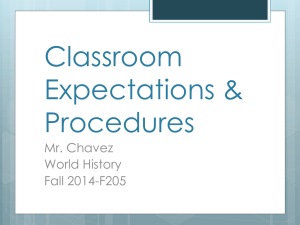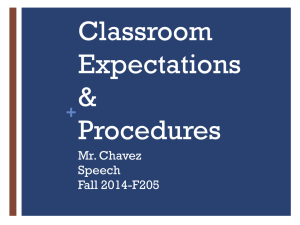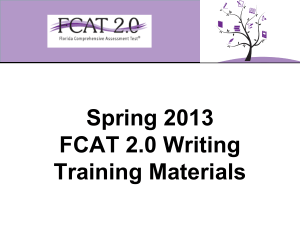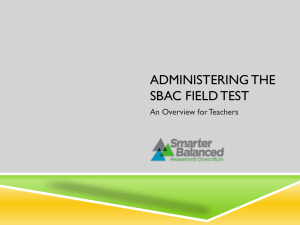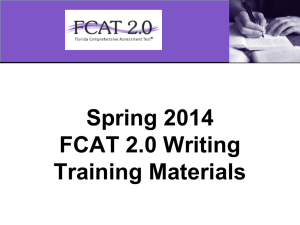Spring 2014 Training Materials
advertisement
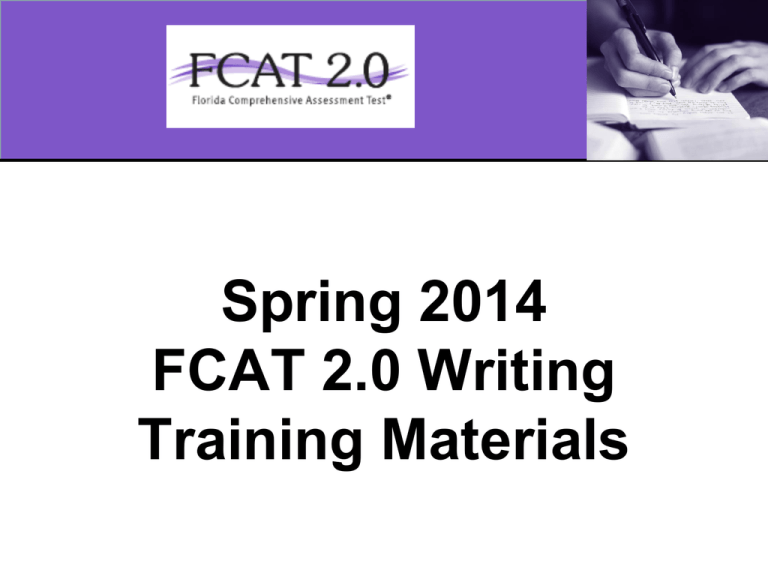
Spring 2014 FCAT 2.0 Writing Training Materials Overview These training materials highlight important information regarding test administration policies and procedures. Not all information from the test administration manual is included in this presentation, so it is imperative that district and school staff read and familiarize themselves with all information in the manual in addition to using these training materials. Daily Administration Schedule Day 1 – Tuesday, February 25, 2014 Grades 4, 8, 10 Writing Test 60 minutes Day 2 – Wednesday, February 26, 2014 Grades 4, 8, 10 Writing Make-Up Test 60 minutes Any deviation from this schedule requires written approval from the FDOE prior to implementation. To-be-scored AND Not-to-be-scored boxes are due to Accountability by 4:00 PM, Friday, February 28th. What’s New Required Administration Information • The list of required administration information has been updated to include both the accommodations provided to students and the accommodations used by students during the test administration. – If a student does not use an accommodation that is provided, the school assessment coordinator should be notified when testing is completed, and the accommodation should not be recorded on the student grid sheet. • Schools are responsible for maintaining documentation of accommodations that are provided but not used. • The blank Administration Record/Security Checklist has been updated to include fields for recording both accommodations provided and accommodations used. What’s New Test Security Statute and Rule • Florida Test Security Statute, Section 1008.24, F.S., and Florida State Board of Education Test Security Rule 6A-10.042, FAC, located in Appendix B, are now printed on perforated pages that may be removed for review during trainings. What’s New Student Grid Sheets • The English Language Learner (ELL) category on student grid sheets no longer records the length of time ELLs have been receiving ESOL services but is now updated to record the length of time ELLs have been enrolled in a U.S. school. What’s New Testing Rules Acknowledgment • The last portion of the testing rules read to students now reads, “After the test, you may not discuss the Writing prompt with anyone. This includes any type of electronic communication, such as texting, emailing, or posting online, for example, on websites like Facebook, Twitter, or Instagram. If you are found sharing information about the Writing prompt, even without the intent to cheat, your test will be invalidated.” • Students and their parents/guardians should be made aware of this clarification to the testing rules prior to testing. Reminders Session Length and Make-Up Tests • The Spring FCAT 2.0 Writing Test is 60 minutes long. Test administrators are required to use ALL of the allotted time for the Writing test and should not end the test early or collect test materials prior to the end of the allotted time. • There is only ONE day for make-up tests. District and school personnel should plan accordingly and make students and parents/guardians aware that there is only one make-up day. Reminders Electronic Devices • Students may not have any electronic or recording devices at their desks, in their pockets, or anywhere they can reach them during testing, even if they are turned off or they do not use them. • If a student is found to be in possession of ANY electronic devices during testing OR during a break, his or her test must be invalidated. • Students and parents/guardians should be made aware of this policy prior to testing. Reminders Chain of Custody Forms • Schools are required to maintain a Test Materials Chain of Custody Form located at www.FLAssessments.com/Writing and in Appendix C. – Record accurate information on the form, including the dates and times activities are completed, the names of the people performing activities involving the materials, and information about the locked storage room. – Retain electronic or hard copies of completed forms after materials are packaged for pickup, and email or return the originals to the district assessment coordinator. Reminders Leaving Campus • If a student begins a test and leaves campus without finishing (due to an appointment, illness, etc.), he or she will NOT be allowed to complete that test. • No exceptions will be made once the student leaves the school’s campus, so students and parents/guardians must be made aware of this policy. • If a test administrator has concerns about a student (e.g., if a student seems ill), that student should be tested on the make-up day. Reminders Writing Folders • Writing folders include security numbers to assist in the tracking of these secure documents. • School assessment coordinators and test administrators must maintain records of required administration information that include the security numbers of Writing folders assigned to them. • A security number consists of a nine-digit number followed by a check digit (located in upper right corner of Writing folders). Reminders Test Group Codes • Writing folders do not contain a field for a test group code; however, test group codes must still be used to identify groups of students tested together. • Test group codes must be recorded with required administration information and on seating charts. Reminders Test Administrator Policies • ALL test administrators must be certified educators. • Test administrators are required to sign a Test Administrator Prohibited Activities Agreement in addition to a Security Agreement. Test administrators must record their certification numbers on this document. • The FCAT 2.0 Test Administration and Security Agreement and the Test Administrator Prohibited Activities Agreement may be copied together so that double-sided, single-page copies can be distributed to test administrators. • School assessment coordinators must file the signed agreements. Reminders Test Administrator Policies (cont.) • Test administrators must NOT administer the FCAT 2.0 Writing assessment to their family members. In addition, under no circumstances may a student’s parent/guardian be present in a student’s testing room. • Test administration manuals must be provided to itinerant teachers in time for them to prepare for a test administration. These teachers must also be included in test administrator training. Reminders Seating Charts • Test administrators are required to maintain an accurate seating chart for each group of students in their rooms during testing. • All seating charts must indicate the front and back of the room, as well as the direction the students are facing. • If students are moved to a different location or the seating configuration changes during testing, a new seating chart must be created and maintained. Students to Be Tested All Grades 4, 8, and 10 students, including retained students, are required to participate in FCAT 2.0 Writing. Special documents (large print and braille) are available for the Writing test, and administration accommodations may be provided to eligible students with IEPs, Section 504 plans, or ELL plans. Special Program Students • We are testing full-time FLVS students, who have registered, at the LCPEC. Students to Be Tested English Language Learners (ELLs) • All ELLs are expected to participate in FCAT 2.0 Writing. Students With Disabilities • Students with disabilities participate in the statewide assessment program by taking one of the following: – FCAT 2.0 without accommodations, – FCAT 2.0 with accommodations, or – Florida Alternate Assessment. • All determinations regarding participation in the statewide assessment program must be documented in the student’s IEP or Section 504 plan. See Appendix A of the manual for information regarding accommodations. Test Materials School personnel must adhere to the following policies as they prepare student materials: • School staff may verify and apply labels and/or complete student grid sheets no sooner than one week prior to testing. • Only the school assessment coordinator and school personnel designated by the building/site administrator may open the shrink-wrapped packages and affix labels. • Do not use student labels from previous administrations. • Students are not permitted to assist in preparing secure materials before testing or in organizing and returning materials after testing. • The Test Materials Chain of Custody Form must be maintained at all times. • After preparation, all secure materials must be returned to locked storage and remain there until testing begins. PreID Labels • The PreID roster should be verified against the school’s student information database. • Verify that students with PreID labels are still enrolled and will be tested. • FIVE elements MUST be correct on a student PreID label: – Student name – Student ID number – District number – School number – Grade level Destroy labels in a secure manner if ANY of this information is incorrect. • If any other preidentified information (e.g., date of birth) is incorrect, use the label. PreID Labels • Affix the label in the box in the lower left corner of the student grid sheet. • Do not remove labels once they have been affixed. • Do not place a label over another label. PreID Labels • If the student name, student ID number, district number, school number, or grade level is INCORRECT on a USED Writing folder, the student must, under the supervision of the test administrator, transfer his or her exact response into a replacement folder. • The student grid sheet of the replacement folder MUST be gridded. • Grid the DNS bubble on the folder with the incorrect label affixed and set it aside to be returned to the school assessment coordinator with all other NOT TO BE SCORED materials. Security Numbers • As directed by the school coordinator, test administrators may use the pre-populated administration record/security checklist, a blank copy of the checklist, or may make his/her own comprehensive record of security numbers. • Security number(s) of the folder(s) assigned to and returned by each student should be recorded and verified at the completion of testing. • Security numbers of Writing folders not already listed on the checklist (e.g., materials distributed from district overage) MUST be added to the record with the names of the students to whom the test materials are assigned. Administration Record/ Security Checklist • School assessment coordinators may use the checklist to record the security numbers of the documents assigned to and returned by each test administrator. • A blank version of the form can be found in Appendix C and at www.FLAssessments.com/Writing. • Pre-populated lists with security numbers for all secure folders assigned to each school are available for district and school personnel in PearsonAccess. Proctors • When testing a large group of students, proctors must be assigned to the room. Refer to the table below for the required number of proctors. • FDOE strongly encourages the use of proctors in all testing rooms, even those with 30 or fewer students. • FDOE discourages testing students in large groups (e.g., in the cafeteria or auditorium). If a school must test students in a large group, the correct number of proctors MUST be assigned and a seating chart carefully maintained. Test Security Per Test Security Statute, s. 1008.24, F.S., and Florida State Board Rule, 6A-10.042, FAC, inappropriate actions by school or district personnel can result in student or classroom invalidations, loss of teaching certification, and/or involvement of law enforcement. Examples of prohibited activities include the following: • • • • • • • Reading the Writing prompts before, during, or after testing Revealing the Writing prompts Copying the Writing prompts Explaining or reading the Writing prompts for students Copying or reading student responses or used planning sheets Changing or otherwise interfering with student responses Causing achievement of schools to be inaccurately measured or reported Missing Materials • Schools must investigate ANY report of missing materials and report missing secure materials (e.g., Writing folder, used planning sheet) to the district assessment coordinator immediately, by entering the issue into http://help or http://help.leeschools.net. • Within 30 calendar days of the incident, a written report must be submitted to the FDOE. The report must include: − − − − The nature of the situation The time and place of the occurrence The names of the people involved A description of the communication between the district assessment coordinator’s office and school personnel − How the incident was resolved − What steps are being implemented to avoid future losses • Schools should submit completed reports to the district office, and district assessment coordinators should then submit reports to FDOE. • A form to report missing materials can be found at www.FLAssessments.com/Writing. Testing Irregularities/ Security Breaches • Test administrators should report any test irregularities (e.g., disruptive students) and possible security breaches to the school assessment coordinator immediately. • If a test irregularity or security breach is identified, the school assessment coordinator must contact the district assessment coordinator to discuss possible test invalidations. Test Invalidation • District assessment coordinators will advise schools of the appropriate course of action if invalidation is being considered. Remember that the purpose of invalidation is to identify when the validity of test results has been compromised. – If you are unclear as to whether a test should be invalidated, please contact Accountability immediately at 337-8647. • If a situation described in the “Test Invalidation” section on pages 17–18 of the manual occurs, test administrators should discuss the situation with the school assessment coordinator, and the situation should be investigated immediately. Test Administrator Before Testing Checklist 1. Read the test administration manual. 2. Read the Test Administration Policies and Procedures and Appendix B, and sign the FCAT 2.0 Test Administration and Security Agreement. 3. Read and sign the Test Administrator Prohibited Activities Agreement. 4. Establish an appropriate setting for test administration and remove or cover any unauthorized aids in the testing room. 5. Prepare a security log and a seating chart, and ensure you have a form to collect require administration information. 6. Assemble all testing materials needed for test administration, and ensure student demographic information is verified on PreID labels or gridded on student grid sheets. 7. Ensure that students and their parents/guardians understand the testing policies (electronic devices, leaving campus, Testing Rules Acknowledgment, discussing test content) prior to the test. 8. If you are administering the test to students who require accommodations, become familiar with the accommodations and discuss with your school coordinator how accommodations will be provided. Test Administrator Before Testing • Sign and return an FCAT 2.0 Test Administration and Security Agreement, which indicates that you: − Have received training − Have read the Test Security Statute and State Board Rule − Have read all applicable portions of the test administration manual − Understand and agree to adhere to all test security and administration policies and procedures • Sign and return a Test Administrator Prohibited Activities Form Test Administrator Before Testing Prepare the Room for Testing • The test should be administered in a room that has comfortable seating, good lighting, and sufficient workspace. • There must be at least three feet between students. • Make sure that students are not facing each other when seated at tables and are not in seating (stadium or staggered) that allows them to easily view other students’ test materials. • Post the sign that reads TESTING—Please Do Not Disturb on all entrances to the testing room and display starting and stopping times for students as soon as testing begins. • Students must not have access to any unauthorized aids, including visual aids on classroom walls or desktops (e.g., word lists, punctuation charts). Test Administrator Before Testing Required Administration Information • Test Administrators must record and maintain the following required administration information: – Students assigned to the room – Attendance information – Accommodations provided (see accommodations codes on page 21 of the test administration manual) – Accommodations used – Test group code – Grade level – Unique security number of secure documents assigned to each student – Signatures of test administrator and school assessment coordinator – Dates for when Writing folders are received and returned Test Administrator Before Testing Seating Charts • An accurate seating chart must be maintained for each testing room. Seating charts must record the following information: – – – – – – – – Room name/number Student names and their location in the room during testing Direction students are facing Date Test starting and stopping times Test administrator name Names of proctors (if applicable) Test group code • All seating charts must indicate the front and back of the room. • If the seating configuration changes during testing, a new seating chart must be created. Test Administrator Before Testing A Security Log must be maintained for each testing room. Anyone who enters a room for the purpose of monitoring a test MUST sign the log for that testing room. Test Administrator Before Testing Assemble Materials • The Test Administration Manual is needed on the day of testing to read scripts to students, to ensure accurate timing for test sessions, and as a reference to avoid testing irregularities. • A Test Group Code will be provided by your school assessment coordinator; a unique code must be recorded on your required administration information and seating chart. • Test Administrator Checklist (located in Appendix C). Test Administrator Before Testing Assemble Materials (cont’d) • Signs (located in Appendix C) − Do Not Disturb (posted on entrances to the testing room) − Electronic Devices (displayed for students) • Security Log (located in Appendix C) • Seating Chart • Record of Required Administration Information • Pencils for students, if needed • Watch or Clock to keep accurate time during testing Test Administrator Before Testing Special Documents • Ensure that the correct procedures are followed for administering tests to students using special documents. • Student responses must be recorded properly in all special documents before they are submitted for scoring. • Refer to the Special Document sections of the manual to ensure the proper handling of these materials. Test Administrator Before Testing Accommodations Test administrators who will administer tests to students using accommodations must familiarize themselves with the information in Appendix A, including • Allowable accommodations • Test configurations and materials needed for testing • Scripts/instructions for administering tests to students using special documents (large print, braille) • Instructions for return of special documents Test Administrator Before Testing Communicate Testing Policies to Parents/Guardians and Students The parent notification letter is posted on the Writing page of the Test Coordinator Web site (http://accountability.leeschools.net/tc/fcatwriting.html). • Electronic Devices Policy—If students are found with ANY electronic devices, including, but not limited to, cell phones and smartphones, during testing OR during breaks, their tests will be invalidated. The best practice would be for students to leave devices at home or in their lockers on testing days. • Leaving Campus—If students leave campus before completing the test (for lunch, an appointment, or illness, etc.), they WILL NOT be allowed to complete the test. Students and parents/guardians should be made aware of this policy. If a student does not feel well on the day of testing, it may be best for the student to wait and be tested on the make-up day. Please make sure parents/guardians are aware of the test administration schedule and understand that appointments should not be scheduled on the testing day. Test Administrator Before Testing Communicate Testing Policies to Parents/Guardians and Students (cont.) • Testing Rules Acknowledgment—Prior to testing, students will sign below a Testing Rules Acknowledgment on the back of the planning sheet that reads: “I understand the testing rules that were just read to me. If I do not follow these rules, my test score may be invalidated.” • Discussing Test Content after Testing—The last portion of the testing rules read to students before they sign below the acknowledgment reads, “After the test, you may not discuss the Writing prompt with anyone. This includes any type of electronic communication, such as texting, emailing, or posting online, for example, on websites like Facebook, Twitter, or Instagram. If you are found sharing information about the Writing prompt, even without the intent to cheat, your test will be invalidated.” Please make sure that students understand this policy prior to testing and remind them that “discussing” the prompt includes any kind of electronic communication, such as texting, emailing, or posting to blogs or social media websites, etc. Test Administrator During Testing Checklist 1. Maintain your seating chart and record of required administration information. 2. Ensure that proctors and anyone who enters your room for the purpose of monitoring the test sign the Security Log for your testing room. 3. Administer the test according to the directions in the test administration script and read the SAY boxes verbatim to students. Test Administrator During Testing Supervise test administration and ensure the following: • Students are using No. 2 pencils • Students do not have books, notes, scratch paper (other than their planning sheets), or electronic devices of any kind during testing, even if they do not use them • Students have signed below the Testing Rules Acknowledgment • Students do not talk or make any disturbance • Students are working independently • Students who use their planning sheets allow themselves enough time to write complete responses in their Writing folders • Students are recording their responses in the appropriate area Test Administrator During Testing • It is not appropriate to use cell or classroom phones, grade papers, or work on the computer during testing. • While you may encourage students to continue working, you may not talk with them about the prompt or help them with their responses. • If students finish the test before the allotted time for the session has elapsed, you may encourage them to go back and check their work. You may not collect test materials prior to the end of the 60-minute session. • FCAT 2.0 Writing is administered in one 60-minute session – failure to provide the correct amount of time will likely result in test invalidation. Keep accurate time and display times for students as instructed in the script. Test Administrator After Testing Checklist 1. Verify that you have collected all required administration information, including accommodations provided and accommodations used by each student, and make copies for your files. 2. Verify that your seating chart and Security Log have been completed correctly, and make copies for your files. 3. Inspect students’ Writing folders for stray marks on the student grid sheet, verify that each student has completed the required information in the upper left corner of the grid sheet, and remove any stray planning sheets. Do NOT open Writing folders or review student responses. 4. Check to make sure DNS bubbles have not been gridded by mistake and that DNS bubbles are gridded on invalidated test documents. 5. Organize test materials and return them to your school assessment coordinator (see pages 39-40 in the manual). School Assessment Coordinator Before Testing Checklist 1. Read the test administration manual and resolve any questions you may have with your district assessment coordinator. 2. Read the Test Administration Policies and Procedures and Appendix B, then sign an FCAT 2.0 Test Administration and Security Agreement. 3. Train your test administrators and proctors, and ensure that they sign an FCAT 2.0 Test Administration and Security Agreement. 4. Ensure that test administrators sign a Test Administrator Prohibited Activities Agreement. 5. Receive test materials from your district assessment coordinator. Maintain an accurate Test Materials Chain of Custody Form at your school. 6. Inventory materials within 24 hours and report any missing materials or request additional materials immediately. Remember that you may not open shrink-wrapped packages more than one week prior to testing. 7. Communicate the process for collecting required administration information to test administrators. School Assessment Coordinator Before Testing Checklist 8. Maintain a record of required administration information to track secure materials you receive from your district assessment coordinator. 9. Assign proctors, as needed. 10. Ensure that appropriate test settings are available. 11. If any students who require accommodations are testing at your school, discuss how accommodations will be provided with test administrators. 12. Verify student information on PreID labels and affix labels to Writing folders. Complete student grid sheets when necessary. 13. Distribute test group codes to test administrators 14. Make arrangements to test any special program students who may be testing at your school. School Assessment Coordinator Before Testing Receive Test Materials • You will receive the following materials, as appropriate for your school: – School Boxes (test materials—contents listed on pages 41-42 of the manual) – Special Document Boxes • Save the original boxes for returning TO BE SCORED special document materials. • If you need additional materials, please input a request into http://help or http://help.leeschools.net. School Assessment Coordinator Before Testing Maintain Security • Inventory the contents of your boxes within 24 hours of receipt and report missing materials immediately. • Keep materials secure at all times. • Maintain the Test Materials Chain of Custody Form at all times. • No more than three people should have access to the locked storage area. • Do not open shrink-wrapped materials or begin preparing materials (applying student labels) more than one week prior to testing. School Assessment Coordinator Before Testing Train Test Administrators and Proctors • You are responsible for training all test administrators and proctors, including non-school-based instructors (e.g., itinerant teachers). You must train several employees to act as possible alternates. • Test administrators must be certified educators. • Test administrators who will be administering the test to students using large print or braille materials must be trained in the use of these test materials. • For students with accommodations, make sure that test administrators are aware of and have made provisions for the exact accommodations needed for individual students. School Assessment Coordinator Before Testing Train Test Administrators and Proctors • Distribute test administration manuals and instruct test administrators to read all appropriate sections. • Ensure that all test administrators maintain the following according to the requirements in the manual: − Records of Required Administration Information − Seating Charts − Security Logs • Review test security policy and procedures and collect the following: − Signed FCAT 2.0 Test Administration and Security Agreements − Signed Test Administrator Prohibited Activities Agreements • Encourage test administrators to use the checklist found in Appendix C. School Assessment Coordinator Before Testing Prepare for Testing • Distribute test group codes to test administrators. • Assign proctors to test sessions. • Provide appropriate test settings. − Ensure visual aids are covered or removed. − There must be at least three feet between students. − Test in classrooms whenever possible. • Make arrangements to test special program students not enrolled in your school, if any. School Assessment Coordinator During Testing Checklist 1. Distribute Writing folders and planning sheets for students in each testing room immediately before testing is schedule to begin. Do NOT distribute these materials ahead of time. 2. Provide test administrators with additional materials, as necessary. 3. Monitor each testing room to ensure that test administration and test security policies and procedures are followed, seating charts and Security Logs are properly completed, and required administration information is collected. 4. Be available during testing to answer questions from test administrators. 5. Arrange for and supervise make-up administrations. School Assessment Coordinator After Testing Checklist 1. Verify that all distributed secure materials have been returned. Complete the Test Materials Chain of Custody Form. Report any missing materials to your district assessment coordinator and conduct the necessary investigation. 2. Make copies of all collected required administration information, seating charts, Security Logs, and Chain of Custody forms. File the copies and return the originals in the District Assessment Coordinator ONLY boxes. 3. Inspect students’ Writing folders for stray marks ONLY on student grid sheets, verify that each student has completed the required information in the upper left corner of the grid sheet, and remove any stray planning sheets. Do NOT open Writing folders or review student responses. 4. Check to make sure DNS bubbles have not been gridded by mistake and that DNS bubbles are gridded on invalidated test documents. 5. Organize test materials and return them to your district assessment coordinator. School Assessment Coordinator After Testing Document Count Forms • Do not copy blank count forms; however, once the count forms are completed, you may copy them for your records. If you need additional count forms, please input a HELP request at http://help or http://help.leeschools.net. • Verify that you have included all Writing folders from make-up tests before you complete the forms. • Place each completed form on top of the first stack of corresponding TO BE SCORED Writing folders. • Separate Document Count Forms must be completed for any special program student documents (Home Ed, Virtual School, etc.). Ensure that the correct district and school numbers are gridded (refer to the chart on page 48 of the manual for special program district/school numbers). Grid the correct grade level/document type, number of documents under the form, and special document type, if applicable. Complete a separate Document Count Form for each grade level. School Assessment Coordinator After Testing Paper Bands • Documents for each grade level and special program must be banded separately. You may use more than one paper band per grade level, if necessary. • On each paper band, provide the appropriate district/school number, school name, number of TO BE SCORED documents contained in the paper band, and number of banded stacks per Document Count Form. • Under Number of Banded Stacks per Document Count Form, number the paper bands 1 of n, 2 of n, etc., where n is the total number of banded stacks per Document Count Form. • Place a paper band around each stack of TO BE SCORED Writing folders. The Document Count Form must be under the paper band on top of the stack labeled 1 of n. • Seal the paper band and be sure that it securely holds the folders. Do not use staples, paper clips, or tape. School Assessment Coordinator After Testing • Prepare the following types of boxes for return to your district assessment coordinator: – All TO BE SCORED Writing folders—Red-labeled boxes – All NOT TO BE SCORED materials (including NOT TO BE SCORED special documents)—Yellow-labeled boxes – All TO BE SCORED large print materials, if applicable—White-labeled boxes – All TO BE SCORED braille materials, if applicable—Pink-labeled boxes – District Assessment Coordinator ONLY box • It is your responsibility to package all materials correctly. Mispackaged materials will delay reporting of student results. • See pages 51–57 of the manual for instructions on the packaging and return of test materials, including large print and braille materials. • To-be-scored AND Not-to-be-scored boxes are due to Accountability by 4:00 PM, Friday, February 28th. School Assessment Coordinator After Testing Package Materials for Return • Place your school’s TO BE SCORED Writing folders in the boxes according to the diagram on page 55 of the manual. • You may place materials for more than one grade level in a box. • Place the appropriate colored label in the square on the top of each box that reads “Apply return shipping label here.” • Labels may be placed over any existing shipping labels (e.g., vendor or carrier labels). Do not copy labels. • If you need additional return labels, please input a request at http://help or http://help.leeschools.net. School Assessment Coordinator After Testing District Assessment Coordinator ONLY Box • Place the following materials in the District Assessment Coordinator ONLY box: – Used planning sheets (with signed Testing Rules Acknowledgment) – Original records of required administration information (keep a copy for your records) – Original Security Logs (keep a copy for your records) – Original seating charts (keep a copy for your records) – Original Test Materials Chain of Custody Forms (keep a copy for your records) • Seal the box. • Complete the DTCO form (http://accountability.leeschools.net/tc/pdf/2013-14/SP14-Writing-DTCOB-Label.docx) and attach it to the box. • Return the box to Accountability by 9:00 AM, Tuesday, March 4th. Appendices Appendices in the Spring 2014 Writing Test Administration Manual include: • Appendix A—Accommodations • Appendix B—Test Security Statute and Rule • Appendix C—Forms, Cover Sheets, Checklists, Signs Appendix A: Accommodations • Appendix A provides specific information and instructions regarding the following: – Accommodations for Students with Disabilities – Accommodations for English Language Learners – Special documents (large print, braille) • School personnel responsible for administering tests to students with accommodations must familiarize themselves with all relevant information in Appendix A before testing. Appendix B: Test Security Statute and Rule • Appendix B of the manual contains the following: – Florida Test Security Statute (s. 1008.24, F.S.) – Florida State Board of Education Test Security Rule (6A-10.042) • All personnel involved in testing activities, including the handling and maintenance of test materials, must read and understand the information in Appendix B prior to signing a Security Agreement. • The Statute and Rule in Appendix B are printed on perforated pages that may be removed for use during trainings. Appendix C: Forms, Cover Sheets, Checklists, Signs Appendix C contains the following documents to be copied and used before, during, or after testing: – – – – – – FCAT 2.0 Administration and Security Agreement Test Administrator Prohibited Activities Agreement Test Materials Chain of Custody Form Security Log Administration Record/Security Checklist (blank) Checklists • Test Administrator • School Assessment Coordinator • District Assessment Coordinator – Signs • Electronic Devices • Do Not Disturb − Sample Planning Sheet – Cover Sheets PearsonAccess Resources The following materials may be found on the PearsonAccess website under the Support tab: – – – – – – – – – Test administration manual Forms to report missing materials and test irregularities/security breaches Training materials Comment forms Blank Administration Record/Security Checklist Security Log Materials Return List Braille Script FCAT 2.0 Test Administration and Security Agreement, Test Administrator Prohibited Activities Agreement, Test Materials Chain of Custody Form – Parent/guardian letters – Checklists for reference before, during, and after testing Questions/Requests • Please use http://help or http://help.leeschools.net to enter requests for materials. • If you have a testing issue on test day, please contact Accountability at 337-8647.
